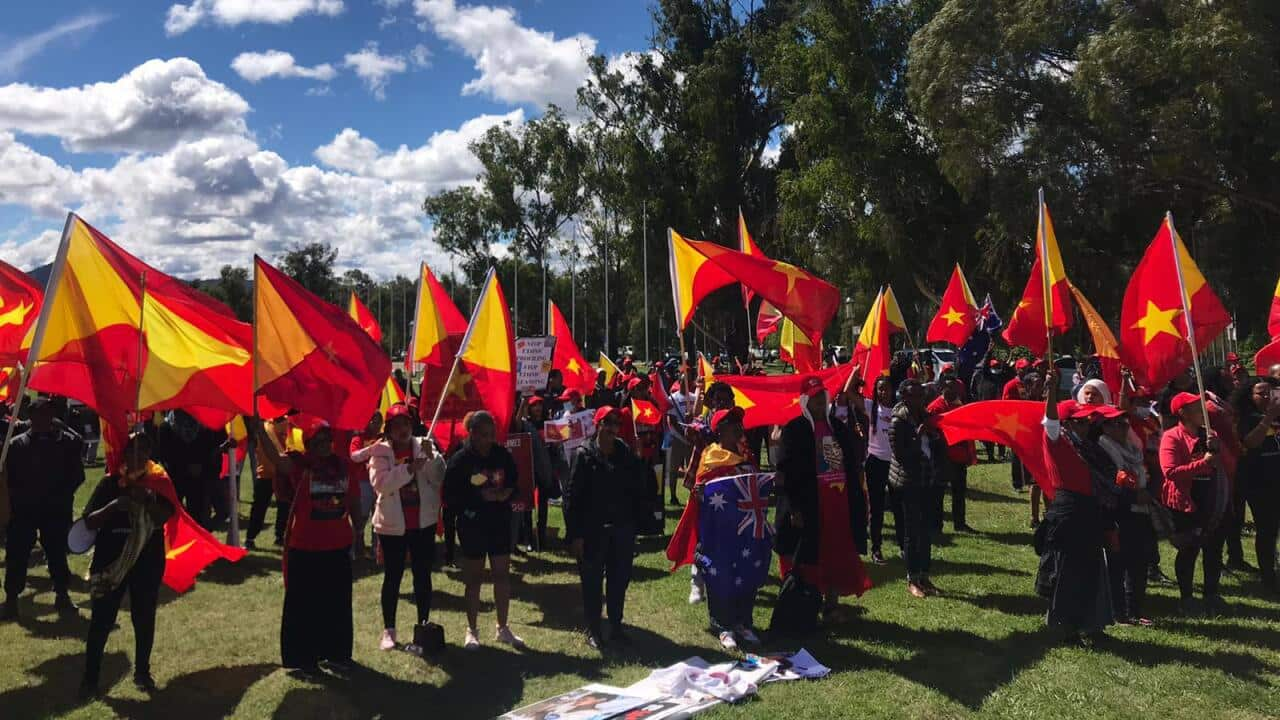Ethiopia's ambassador to Australia has vehemently denied allegations famine is being used as a weapon of war in the embattled northern Tigray region, saying the government has been misunderstood.
The violence that began seven months ago has killed thousands of civilians and forced more than two million people from their homes.
It has damaged Prime Minister and Nobel Peace Prize winner Abiy Ahmed’s standing as a peacemaker, but his administration has remained defiant in the face of international criticism.
Concerns in recent weeks have been raised about a famine breaking out in the region, with analysis by UN agencies and aid groups finding , with millions more at risk.
But Ethiopian officials including Muktar Kedir Abdu, the country's ambassador to Australia, have denied suggestions food aid is being deliberately withheld.
“The accusation against the Ethiopian government of using starvation as a weapon of war is completely politically motivated and totally baseless,” Dr Abdu told SBS News. He said the Ethiopian government has been “massively investing in the provision of humanitarian aid”, including millions of dollars for food assistance, and collaborating with international organisations to deliver it.
He said the Ethiopian government has been “massively investing in the provision of humanitarian aid”, including millions of dollars for food assistance, and collaborating with international organisations to deliver it.

Ethiopian women hold out sacks to receive portions of split peas after it was distributed in the town of Agula, Tigray, May 8, 2021. Source: AP
“When you add [that] up, how can one possibly argue that the Ethiopian government is using starvation, hunger as a weapon on its own citizens, while the same government is investing this whole lot of money and effort to provide humanitarian aid?”
Dr Abdu also said Ethiopia “vehemently disagrees” with the methods employed by the UN and aid groups in their analysis earlier this month.
The fighting started in November last year after Tigray held regional elections the government called illegal.
Mr Abiy sent the army in to oust the ruling Tigray People’s Liberation Front party there. Eritrean soldiers and allied militias joined the fight, and since then, allegations of grave human rights abuses have been levelled.
The UN rights chief voiced alarm earlier this week at continued reports of "serious violations" in Tigray by all parties in the conflict.
Ethiopia’s Human Rights Commission, in collaboration with the UN, has commenced an inquiry into accounts of mass rapes, killings and forced starvation of ethnic Tigrayans.
But some have questioned the government-affiliated human rights body, instead calling for the UN to be allowed to investigate independently.
Dr Abdu said there was no need for that and the government was committed to taking “corrective measures”.
“The Ethiopian government is really transparent and ready to collaborate with international organisations,” he said.
“The most important thing is really conducting an investigation which is professionally fit for the purpose. Allowing other international organisations to participate in transparent processes, I think this will be the source of the credibility of findings they will come up with.”
Calling on Canberra
Earlier this week, Australia’s Tigrayan community descended on Canberra, again calling on the federal government to take greater diplomatic action to stabilise the situation in Ethiopia.
Eighteen-year-old Kibrom Belay travelled from Melbourne to attend the ‘Hidden Genocide’ event at Parliament House.
Speaking with SBS News, his voice quivered as he described the homeland he left in 2012.
“Of my 18 years of living, the past seven months have been the most difficult,” he said.
“I lost my uncle and seven of my cousins. They were killed by Eritrean and Ethiopian soldiers.” Protester Saron Berhane said her family back in Ethiopia has been struggling to access food.
Protester Saron Berhane said her family back in Ethiopia has been struggling to access food.

Kibrom Belay Source: SBS News
“I have had a lot of family affected by the massacres and destruction of property, land, livestock,” she said.
“I don’t have a lot of faith [the human rights inquiry] will bring people to account,” she said. “I think the evidence is clear that ethnic genocide is happening in Ethiopia by Ethiopian forces.”
Foreign Minister Marise Payne said Australia remains “gravely concerned” by the situation in Tigray.
“We join calls for a humanitarian ceasefire, for Eritrean forces to leave Tigray immediately and for unimpeded humanitarian access to the most vulnerable,” she said in a statement to SBS News.
But Labor MP Peter Khalil said he thinks the Australian government should be pursuing tougher diplomatic measures.
“As a middle power and one of the world's oldest democracies, Australia does have a responsibility to participate in international fora,” he said.
“Try to put our diplomatic effort into it, don't just put out bland statements saying ‘end the violence’. Participate in negotiations and meetings to help resolve this.”
With AFP.


